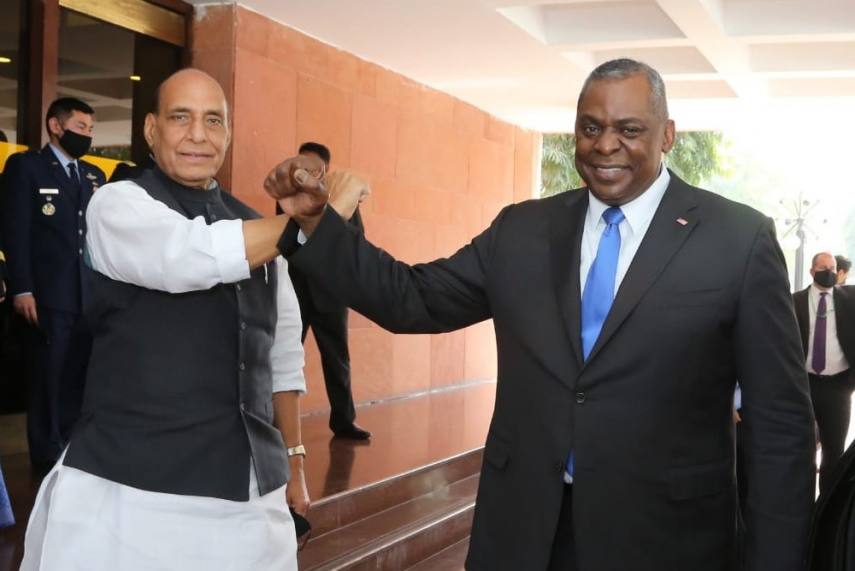
Manas Dasgupta
NEW DELHI, Mar 20: Amidst Beijing’s growing military activities in the South China Sea region, India on Saturday resolved to intensify defence cooperation with the US Central Command in Florida and with the US Commands in the Indo-Pacific region and Africa.
The announcement was made by Defence Minister Rajnath Singh at a joint media briefing after his talks with the visiting U.S. Secretary of Defense General (Retd.) Lloyd James Austin, who described the partnership with India as “central pillar” of the American policy for the Indo-Pacific.
“India, in particular, is an increasingly important partner amid today’s rapidly shifting international dynamics. And I reaffirmed our commitment to a comprehensive and forward-looking defence partnership with India as a central pillar of our approach to the region. As the world faces a global pandemic and growing challenges to an open and stable international system, the US-India relationship is a stronghold of a free and open Indo-Pacific region,” Austin added.
“We reviewed the wide gamut of bilateral and multilateral exercises and agreed to pursue enhanced cooperation with the US Indo-Pacific Command, Central Command and Africa Command. Acknowledging that we have in place the foundational agreements, LEMOA, COMCASA and BECA, we discussed steps to be taken to realise their full potential for mutual benefit,” Singh said. He said the bilateral discussion covered “military-to-military engagement across services, information sharing, cooperation in emerging sectors of defence, and mutual logistics support.”
Responding to a question, Austin said at no stage his country thought “India and China were at war.” He, however, said the US would continue to work with “like-minded countries” to ensure to right things are done to maintain peace.
“We are working with India, Australia and Japan in the Indo-Pacific region to ensure that freedom of navigation is maintained, and to keep the Indo-Pacific region free and open. There are a lot of capabilities in these countries,” said Austin.
“Working with like-minded countries which have shared interest is the only way to check any aggression and we look forward to continue to do that in the future,” he added.
Austin further said the US had a lot of common things with Quad countries like India and Australia in terms of defence perspective and President Joe Biden’s administration will continue to build on that.
Earlier in the day, the Secretary of Defense on a three-day visit to India, paid tributes at the National War Memorial and laid a wreath. He arrived here on Friday and met Prime Minister Narendra Modi. “India in particular is an increasingly important partner among today’s rapidly shifting international dynamics. I reaffirm our commitment to a comprehensive and forward looking defence partnership with India as a central pillar to our approach to the region,” Austin said. It was Austin’s first trip to India after taking charge on January 22 as part of the Biden-Harris administration.
Austin’s visit is crucial as it comes in the midst of expectations that the U.S. is likely to deliver a message over India’s plans to acquire the Russian S-400 missile defence system in the coming months. The move could attract U.S. sanctions under a law named CAATSA (Countering America’s Adversaries Through Sanctions Act).
In a clear hint to Beijing’s growing military activities in the South China Sea region, Austin said the India-U.S. defence partnership will ‘grow’ in the coming years. “The relationship is a stronghold of a free and open Indo-Pacific region. PM Modi has stated that India stands for freedom of navigation and freedom of overflight, unimpeded lawful commerce and adherence to international law. This is a resounding affirmation of our shared vision for regional security in the Indo-Pacific.”
Reflecting the American policy, Singh drew attention to the recent Leaders’ Summit of India, U.S., Japan and Australia under the Quadrilateral Framework and emphasised the collective “resolve to maintain a free, open and inclusive Indo-Pacific region”. He said both sides also discussed non-traditional challenges like “oil spills and environment disasters, drug trafficking, Illegal, Unreported, Unregulated (IUU) fishing”.
Singh also welcomed U.S. industry and said it should take “advantage of India’s liberalised foreign direct investment policies in the defence sector.”
Austin’s visit to India is first by a top member of Biden’s administration. His visit follows a meeting last week between leaders of Australia, India, Japan and the United States, which together make up the four Indo-Pacific nations known as the Quad.
The Quad is seen as a counterweight to China, who critics say is flexing its military muscle in the South China Sea, East China Sea, Taiwan Strait and along its northern border with India.
China has called the Quad an attempt to contain its ambitions.
In his meeting with Modi, Austin had conveyed Washington’s “strong desire” to further enhance the strategic partnership for peace, stability and prosperity in the Indo-Pacific region and beyond.
“Our work today is grounded in our shared values and converging strategic interests. We discussed opportunities to elevate the US-India Major Defense Partnership, which is a priority of the Biden-Harris administration… through regional security cooperation, military-to-military interactions, and defence trade. In addition, we are continuing to advance new areas of collaboration, including information-sharing, logistics cooperation, artificial intelligence, and cooperation in new domains such as space and cyber sectors,” Austin said.
Rajnath, too, while speaking about the Quad, said, “The summit has emphasized our resolve to maintain a free, open and inclusive Indo-Pacific. Today, we reaffirmed that closer India-US cooperation in partnership with countries keen to uphold rules-based order, can promote security and prosperity in the Indo-Pacific region and beyond. This is also in line with India’s ‘SAGAR’ (Security and Growth for All in the Region) policy.”
Rajnath also appreciated the participation of the US in Aero India 2021 and expressed hope that “American manufacturers will take advantage of India’s liberalized foreign direct investment policies in the defence sector.”












